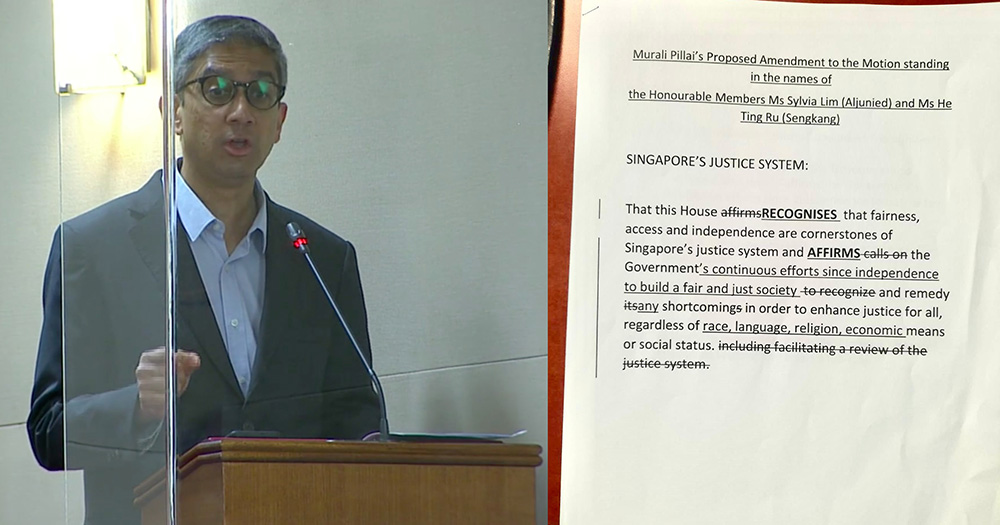On Nov. 4, Singapore's Parliament voted to amend a motion submitted by Workers' Party MP Sylvia Lim regarding the criminal justice system, The Straits Times (ST) reported.
The motion was triggered by the acquittal of an Indonesian maid, Parti Liyani, after she was handed a 26-month jail sentence for allegedly stealing from her employer's family. Parti's employer was Liew Mun Leong, then-chairman of the Changi Airport Group.
The amended motion was passed by a majority of PAP MPs in the House.
Leon Perera: Amendments have changed "meaning and sense of motion"
Subsequently, Workers' Party MP Leon Perera put up a post on Nov. 5 showing the amendments which were proposed by PAP MP Murali Pillai.
Leon said that Murali's amendments "changed the meaning and sense of that motion."
Aside from switching out certain words in the original motion, the biggest change was the omission of WP's call for a review of the justice system to address its shortcomings, particularly in providing equal access to justice.
Here's the WP's original motion:
"That this House affirms that fairness, access and independence are cornerstones of Singapore's justice system, and calls on the Government to recognise and remedy its shortcomings in order to enhance justice for all, regardless of means or social status, including facilitating a review of the justice system."
The amended version, with amendments proposed by Murali and subsequently passed in Parliament, reads:
"That this House recognises that fairness, access and independence are cornerstones of Singapore's justice system, and affirms the Government's continuous efforts since independence to build a fair and just society and remedy any shortcoming in order to enhance justice for all, regardless of race, language, religion, economic means, or social status."
What was the rationale behind the motion?
In her motion speech, WP MP Sylvia Lim said that the poor face structural impediments when they try to seek justice.
The poor are more likely to run afoul of the law as a result of their circumstances, she added
They also face financial hurdles especially when it comes to finding a bailor of sufficient means, and paying composition fines.
Lim's sentiments were echoed by WP MP Gerald Giam who highlighted that such a scenario could be exacerbated in the case of migrant workers as a result of language barriers, the lack of a support network and unfamiliarity with local laws and customs.
In addition, migrant workers who are accused of a crime must remain in Singapore to assist with investigations. Such workers might also face a dilemma with regard to pleading guilty or choosing to claim trial.
This is due to the possibility that the time it takes for them to serve their sentence may be shorter than the time it takes to go through the court processes.
Giam pointed out that Parti spent almost four years in a shelter managed by migrant-welfare organisation HOME while waiting for the conclusion of her case.
She was also fortunate that HOME managed to find a person who could post the S$15,000 bail for her.
What are some of the potential solutions that WP proposed?
In addressing the issue of fines, Lim suggested that public agencies could consider allowing tracked instalment payments of fines. This can help poorer families cope and prevent cases from snowballing into bigger court fines, defaults and arrest warrants.
Meanwhile, Giam suggested the provision of support services to migrant workers who chose to complain against their employers and found themselves without a home and a job.
This support, he elaborated, should not be left entirely to NGOs and their limited resources and must include the provision of basic needs, counselling services and aid to migrant workers on understanding their rights.
He also called for every individual, both local and foreign to be provided with access to legal representation, with legal aid to be made available if they are unable to afford one.
Giam further stated that this aid should be accompanied with means testing to prevent abuse so that only those who are genuinely in need will receive help.
Why amend the motion?
In his response to Lim, Murali added, according to CNA, that it was his hope that the amendments will get "bipartisan support."
With regard to replacing the word "affirms" with "recognises", he added:
"That's really to state the fact that from the outset from Singapore's independence, fairness, access and independence are cornerstones of the Singapore justice system."
He also added that "as a matter of truth":
"The government has been continually putting in the effort since independence to build a fair and just society. To remedy any shortcoming to enhance justice for all, regardless of race, language, religion, economic means, or social status."
As for deleting the proposal to facilitate a review of the justice system, Murali explained:
"This is to leave this motion in broad terms. So that...it is an affirmation that the government would continue to remedy any shortcoming...and really to allow the conversation to happen in this House, about what further steps [need] to be taken.
And one should realise this at the end of the day. The buck stops with this House. It is this House that has to make the political decisions to pass legislation to move amendments to the Constitution in relation to the justice system."
We deliver more stories to you on LinkedIn
Top image collage left screenshot from CNA, right image from Leon Perera Facebook
If you like what you read, follow us on Facebook, Instagram, Twitter and Telegram to get the latest updates.
